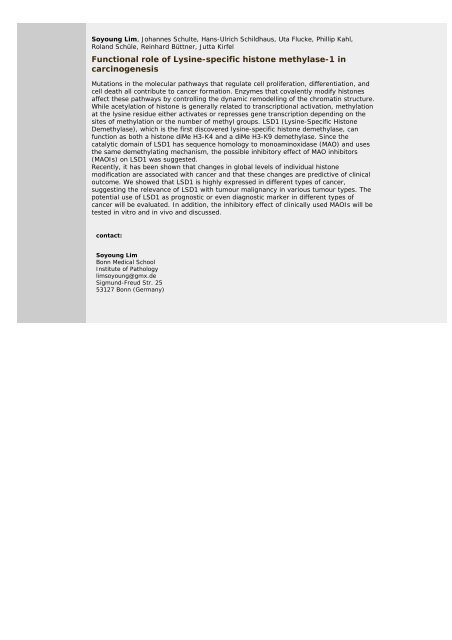Abstracts (poster) - Wissenschaft Online
Abstracts (poster) - Wissenschaft Online
Abstracts (poster) - Wissenschaft Online
Create successful ePaper yourself
Turn your PDF publications into a flip-book with our unique Google optimized e-Paper software.
Soyoung Lim, Johannes Schulte, Hans-Ulrich Schildhaus, Uta Flucke, Phillip Kahl,<br />
Roland Schüle, Reinhard Büttner, Jutta Kirfel<br />
Functional role of Lysine-specific histone methylase-1 in<br />
carcinogenesis<br />
Mutations in the molecular pathways that regulate cell proliferation, differentiation, and<br />
cell death all contribute to cancer formation. Enzymes that covalently modify histones<br />
affect these pathways by controlling the dynamic remodelling of the chromatin structure.<br />
While acetylation of histone is generally related to transcriptional activation, methylation<br />
at the lysine residue either activates or represses gene transcription depending on the<br />
sites of methylation or the number of methyl groups. LSD1 (Lysine-Specific Histone<br />
Demethylase), which is the first discovered lysine-specific histone demethylase, can<br />
function as both a histone diMe H3-K4 and a diMe H3-K9 demethylase. Since the<br />
catalytic domain of LSD1 has sequence homology to monoaminoxidase (MAO) and uses<br />
the same demethylating mechanism, the possible inhibitory effect of MAO inhibitors<br />
(MAOIs) on LSD1 was suggested.<br />
Recently, it has been shown that changes in global levels of individual histone<br />
modification are associated with cancer and that these changes are predictive of clinical<br />
outcome. We showed that LSD1 is highly expressed in different types of cancer,<br />
suggesting the relevance of LSD1 with tumour malignancy in various tumour types. The<br />
potential use of LSD1 as prognostic or even diagnostic marker in different types of<br />
cancer will be evaluated. In addition, the inhibitory effect of clinically used MAOIs will be<br />
tested in vitro and in vivo and discussed.<br />
contact:<br />
Soyoung Lim<br />
Bonn Medical School<br />
Institute of Pathology<br />
limsoyoung@gmx.de<br />
Sigmund-Freud Str. 25<br />
53127 Bonn (Germany)

















